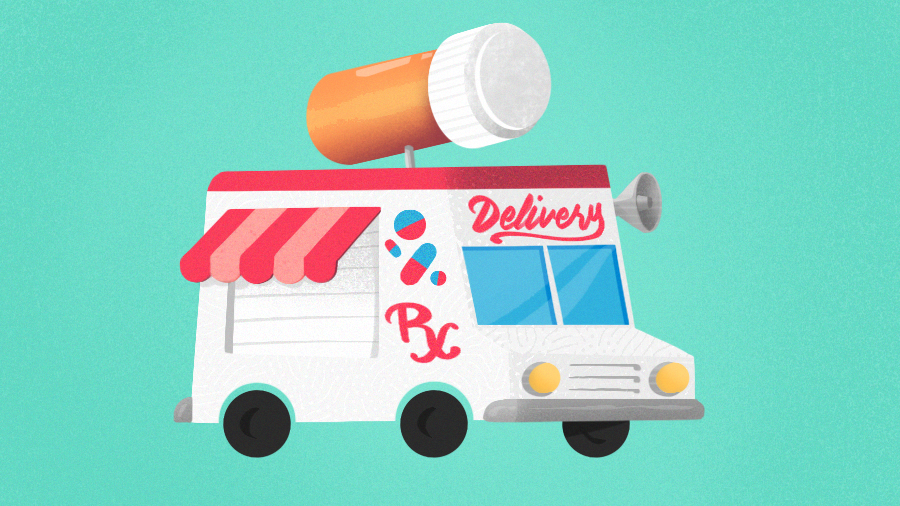Perhaps one of the biggest shifts during the COVID-19 pandemic is the number of patients turning to technology to communicate with their doctors. But the increasing popularity of telemedicine is helping at least one other kind of business: prescription delivery startups.
Subscribe to the Crunchbase Daily
Since the COVID-19 pandemic took hold, some prescription delivery startups are seeing a surge in demand from new users turning to the convenience of delivery. For Mountain View, California-based startup NowRx, the company is seeing an increasing number of referrals from physicians.
“Now, because of coronavirus, the market’s becoming more educated about other options, other delivery pharmacies,” CEO Cary Breese said in an interview with Crunchbase News. NowRx is a full-service pharmacy that accepts all major insurance company plans and offers free same-day delivery.
From a revenue standpoint, NowRx’s first quarter of 2020 is up 30 percent compared to the fourth quarter of 2019, Breese said. And the company has seen the number of new customers increase by 84 percent in Q1 so far, compared to Q4 of 2019.
Last year proved to be the biggest for prescription delivery startup funding in terms of both number of deals and dollars for the past five years. There were 52 funding rounds for prescription delivery companies last year, amounting to $555 million, according to Crunchbase data.

New players in the pharmacy market
Large pharmacies like Walgreens and CVS also offer prescription delivery services, but a growing number of prescription delivery startups have sprung up and funding rounds for them have been steadily climbing.
It should be noted that the majority of VC funding for prescription delivery companies so far this year went to Alto Pharmacy. The company raised a $250 million Series D in January, and that makes up the bulk of the $278 million raised so far, according to Crunchbase.
Karen Martell, Alto Pharmacy’s vice president of business and strategy, also pointed to the rise of telemedicine as helping drive patients to prescription delivery services. Both Alto Pharmacy and NowRx work with physicians to get the message out about their pharmacies to patients.
With the sudden pivot to working from home, doctors have had to quickly figure out how to care for patients when they couldn’t see them in person. Many turned to telemedicine, and Martell said that helped drive new customers to Alto Pharmacy.
“It’s an indication of health care, having worked with doctors so closely at Alto, there’s often some resistance or a slow pace of change in health care. … I think with this, there’s just tremendous innovation and change, and that’s really encouraging to us as we’re trying to provide better access to medication,” Martell said.
NowRx’s Breese echoed a similar sentiment, saying few patients will want to leave their house to pick up a prescription after experiencing the convenience of a virtual visit at home.
“The last thing you want to tell that patient (after a virtual appointment) is get out of your pajamas, put on your clothes, walk down to CVS and stand in line,” Breese said.
It’s not just full-service pharmacies like Alto and NowRx that are seeing an increase in demand. Other companies like telehealth startup Nurx and The Pill Club are seeing more users requesting prescriptions, in their case, for birth control.
Nurx saw a 50 percent increase in new patients for birth control since March; the company now has 250,000 patients for birth control. There’s an increase in demand for all of Nurx’s services, according to company spokeswoman Allison Hoffman, but birth control is the most in demand. The morning-after pill is in high demand as well, Hoffman said.
The Pill Club saw 30 percent more patients in California sign up for the service in March, compared to February. Also in the state, the startup shipped about 50 percent more orders of a one-year supply of birth control to new patients during the extended shelter-in-place order, according to a company representative. The Pill Club also shipped about 20 percent more emergency contraception to new patients in California in March, compared to February.
Prescription delivery post-COVID
The COVID-19 pandemic has made several behaviors the norm during quarantine: grocery delivery, Zoom happy hours and wearing masks when leaving the house. But it begs the question of which of these “quarantine habits” will stick around once life becomes more normal.
Prescription delivery may be one of them.
“Once people experience it … there’s really no going back,” Martell said.
One of the key indicators Alto looks for in terms of “stickiness” is if a new customer who receives a prescription transfers other medications to Alto as well. The company has seen a large spike in additional transfers, and had to staff-up as a result.
“I believe that delivery pharmacy is going to stick,” Breese said. “I think it’s going to continue to persist beyond this immediate surge. I believe it’s shifting into the mainstream and it’s going to be a permanent, paradigm shift.”
Illustration: Dom Guzman

Stay up to date with recent funding rounds, acquisitions, and more with the Crunchbase Daily.



![Illustration of a unicorn with a green money background. [Dom Guzman]](https://news.crunchbase.com/wp-content/uploads/Unicorn_Money_v1-470x352.jpg)
![Computer generating AI data. [Dom Guzman]](https://news.crunchbase.com/wp-content/uploads/AI-generated-470x352.jpg)
![M&A - Illustration of a magnet attracting various products. [Dom Guzman]](https://news.crunchbase.com/wp-content/uploads/mergers_and_acquisitions-470x352.jpg)
![Illustration of a guy watering plants with a blocked hose - Global [Dom Guzman]](https://news.crunchbase.com/wp-content/uploads/quarterly-global-3-300x168.jpg)
67.1K Followers